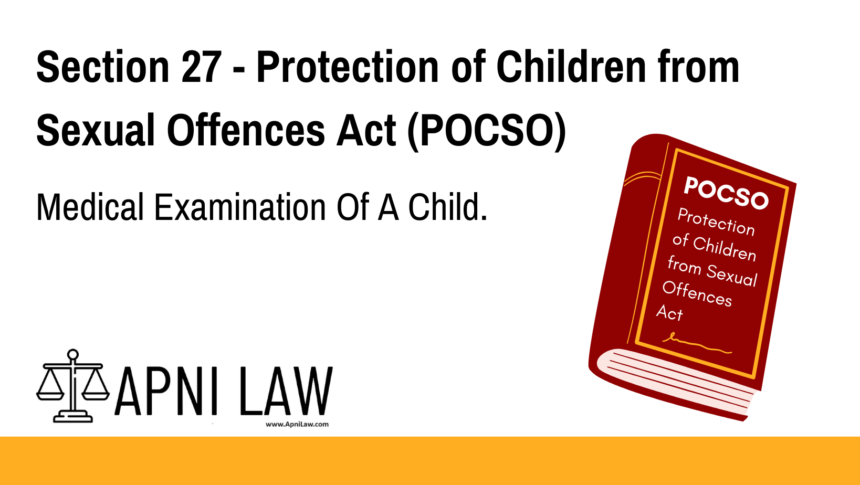Code: Section 27
(1) The medical examination of a child in respect of whom any offence has been committed under this Act, shall, notwithstanding that a First Information Report or complaint has not been registered for the offences under this Act, be conducted in accordance with section 164A of the Code of Criminal Procedure, 1973 (2 of 1973).
(2) In case the victim is a girl child, the medical examination shall be conducted by a woman doctor.
(3) The medical examination shall be conducted in the presence of the parent of the child or any other person in whom the child reposes trust or confidence.
(4) Where, in case the parent of the child or other person referred to in sub-section (3) cannot be present, for any reason, during the medical examination of the child, the medical examination shall be conducted in the presence of a woman nominated by the head of the medical institution.
Explanation of Section 27 POCSO
Section 27 of the POCSO Act provides crucial safeguards related to the medical examination of child victims of sexual offences. It mandates that medical examination can be conducted even in the absence of a formal police complaint and outlines the manner in which such examinations must be conducted to ensure the dignity, safety, and comfort of the child.
Key Provisions:
- Medical examination of a child victim must be conducted in accordance with Section 164A of the CrPC, 1973.
- The absence of a registered FIR does not prevent the examination.
- In the case of a girl child, only a woman doctor is permitted to conduct the examination.
- The child must not be examined alone. A trusted person or parent should be present.
- If a trusted person is unavailable, a woman nominated by the medical institution’s head must be present during the examination.
Illustration
Example 1: Medical Examination Without FIR
A child reports sexual assault, but the police have not yet registered an FIR. Despite this, the child is taken to a hospital, and the doctor conducts the examination under Section 164A CrPC as mandated by Section 27 of the POCSO Act.
Example 2: Girl Child Examination by Woman Doctor
A 10-year-old girl is brought to a government hospital for a medical exam following suspected abuse. The attending physician is male. As per Section 27(2), the hospital arranges for a woman doctor to carry out the examination.
Example 3: Absence of Parent
The child’s parent is unavailable during the examination. A female hospital social worker nominated by the head of the medical institution is present instead, ensuring compliance with Section 27(4).
Common Questions and Answers on Section 27 POCSO
1. Can a child be medically examined before an FIR is registered?
Yes. Section 27 permits a medical examination even if no FIR or complaint has been registered.
2. Is it mandatory for a woman doctor to examine a girl child?
Yes. For girl victims, only a woman doctor is permitted to conduct the medical examination.
3. Can a child be examined alone by a doctor?
No. A parent or a trusted person must be present during the examination. If unavailable, a woman nominated by the medical institution’s head must be present.
4. Under which law is the medical examination conducted?
It is conducted as per Section 164A of the Code of Criminal Procedure, 1973, which lays down the process for medical examination in cases of rape and sexual assault.
5. What if a woman doctor is not available?
Ideally, hospitals must ensure a woman doctor is available. If not, arrangements should be made to bring one in, as compliance with Section 27 is mandatory.
Conclusion
Section 27 of the POCSO Act ensures that child victims of sexual offences receive timely and sensitive medical examinations, even before the legal machinery formally begins. It recognizes the vulnerability of child victims and creates a framework that prioritizes their physical and psychological well-being.
To read more about child protection laws in India, visit ApniLaw.








